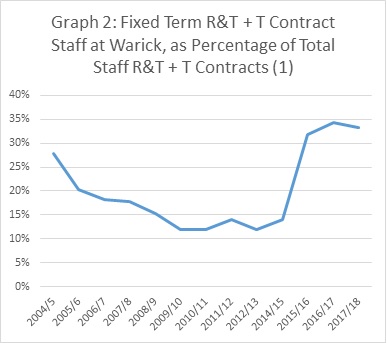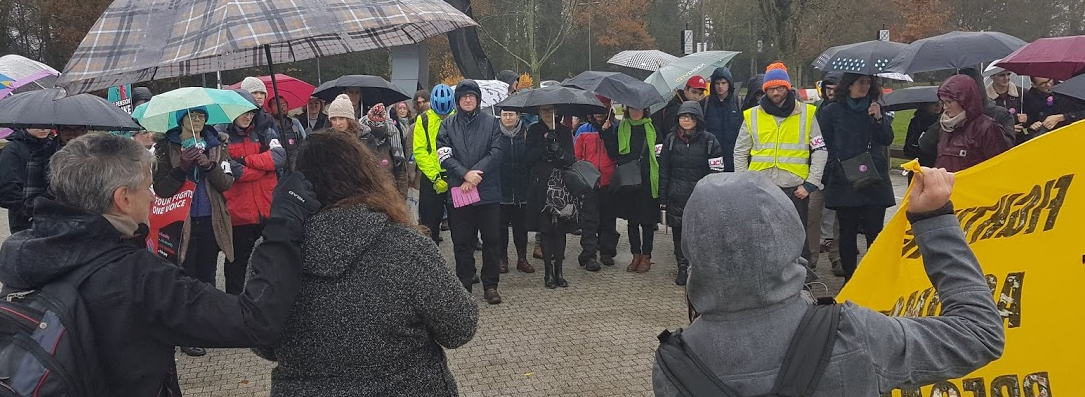Warwick UCU Strike FAQ and guidance for casualised staff (esp. hourly paid workers)
Version 2: 20/02/2018 (The info here will be regularly updated, check warwickucu.org.uk for updates!) PDF available here.
Please feel free to forward this to any of your colleagues that are not in UCU. Note that, unlike the national FAQ’s, these are not checked by union lawyers. If in doubt, always refer to the nationally available information or double-check with UCU.
- I am contracted to teach at Warwick through STP / VAM. Can and should I participate in the strike?
First of all, you have the right to strike if you are a member of UCU, regardless of your contractual status, as long as your contractor is the University of Warwick. This is also clearly stated in the STP Terms and Conditions that are sent out with every contract, under paragraph 19:
“19. Trade Union Membership
You are able to join a trade union of your choice if you wish to do so, and you are entitled to be individually represented by an elected trade union representative. You are able to take strike action if you choose if there is a dispute between your union and the University, but you must give prior notice if you intend to take strike action as indicated above.” [See point 6 on giving notice]
If you are a UCU member, the union very strongly urges you to take strike action. And there are many reasons for that – some of which we have already addressed in a previous email (see also here for UCU’s briefing note for casualised staff). The key point is that as someone at the beginning of your career, you will be particularly affected by the proposed changes to the pensions scheme), since you will have little to no benefits accrued under the current system. Staff towards the end of their career, on the other hand, are less affected as they will still receive the benefits they have built up under the previous scheme. If you want to find out more about the dispute (and there is still time for that), there are some links in the strike dates and resources document.
We cannot emphasise enough how important this issue is for UCU and for the future of UK Higher Education as a whole. As you will have noticed, the plan of holding 14 days of strike is far more serious that any industrial action UCU has taken in the last decades. This shows the gravity of the issue. Once the defined benefits scheme is closed, it is closed forever and there is no turning back. This is unlike any other dispute we have had. This also raises the stakes of this dispute to an equally unprecedented level. It is very important for this strike to be successful and to have high rates of participation: otherwise, our very ability to put pressure on the employers in any future dispute will be undermined.
- I am not a UCU member. Can I also strike?
In order to strike, you have to be a member of UCU. But you can, and in our view should, join UCU. It’s not too late to join now – follow this link: https://www.ucu.org.uk/join, fill in an online form and it is done. You can do it up to the day of the strike, including on the picket line, and you will be covered by the dispute.
As a UCU member, you are protected from victimisation and retaliation, you have access to strike pay, and there are multiple other benefits as well – including and most importantly the solidarity of your colleagues! If you are a postgraduate who teaches, it is free for you to join UCU – but make sure that you join as a full member, not as a student member. If you are a student member but you also do teaching, upgrade your membership NOW to the full membership so you are covered by the dispute and entitled to access strike pay. This upgrade is free if you are a PhD student who teaches. If you are not a PhD student, the membership fee for the lowest earning band is very low – around £1 a month.
- I fear that participating in the strike will make me vulnerable towards my head of department. What if they hold it against me next time I apply for a job, or when my contract is up for renewal?
It is your legal right to take strike action, and it is illegal for any employer to use strike participation against you in any way. However, we are aware that theory and practice don’t always correspond, especially for staff on casual or fixed term contracts who might fear that their future employment prospects could be jeopardised if they take action in breach of their contract or that the department management does not like. As a union, we are doing everything we can to make sure that no one can be singled out and suffer repercussions. In particular:
- Warwick UCU is writing to Heads of Departments to remind them not to use any intimidating practices towards staff in order to prevent them from striking; and to make them aware that the UCU will be monitoring how departments treat staff who take part in the strike. If any evidence emerges that staff who have participated in the strike experience different treatment in the future, or are disadvantaged for future contract renewals, we are telling Heads of Departments that the union will be taking action against these practices in order to protect our members.
- The Provost has agreed that STP workers and fixed term employees should not suffer any detriment as a result of the strike action and she will reiterate this message to Heads of Departments. We have made clear to the Provost that we will be closely monitoring contract renewal rates in the coming academic year in relation to those who have taken strike action.
- We are writing to the Vice Chancellor, who has publicly expressed his opposition to UUK’s plans to change the USS pensions scheme, and we have called on him to show his support for the strike by emphasising in his communications with Heads of Department that any mistreatment or intimidation of staff partaking in the strike will not be tolerated.
- The more of us that take strike action, the less likely it is that individuals can be victimised. We therefore strongly advise you to communicate with your colleagues and your departmental UCU rep and to set up a departmental meeting to prepare for the strike and convince your colleagues to participate. If you need any help in setting up a departmental meeting, write to us and we will try our best to help facilitate a meeting.
- If I participate in the strike or take action short of strike (ASOS), how much pay will I lose?
This is a very important issue especially for casualised staff – whether hourly paid or fixed term. Staff on regular full-time employment contracts risk 1/260th of their pay being docked per strike day (or a pro rata proportion if they work part time). For hourly paid staff, (STP/VAM), it doesn’t work in the same way. In a meeting with management on Friday 9th February we were told that the procedure they are going to apply is the following: tutors should fill in the time sheet honestly, only for work that they have done, and they will be paid according to the hours they submit. Strike pay deductions will thus be applied on the next relevant monthly payment after timesheets are submitted. That means, of course, not to claim contact hours that have not been delivered; other elements can be claimed if the work has been undertaken.
We have been in contact with HR about clarifying the rules they are going to apply for the way in which time sheets are assessed during the strike – both in communication with tutors and with departments. We have now received the following clarification:
- Tutors are expected to fill in their timesheets honestly to claim only for work undertaken
- If strike action disrupts the contact hours, tutors will still be able to claim their preparation time undertaken on a non-strike day, for example in the expectation of the strike being called off
- Departments are expected to approve of tutor’s timesheet submission along the above stipulations
- The only potential challenge to this would be if departments receive repeated claims for preparation “where there is clear knowledge that the contact hour will not be delivered’ e.g “during a period of total strike absence“ (quote from HR email).
We have also now received clarification from HR on the question of how ASOS (Action short of strike) will be treated in relation to workers hired on STP/VAM, and whether tutors can / will be expected to reschedule classes:
- “STP tutors are not obliged to work additional hours to those for which they are contracted when they return from strike action but (as with other staff) HODs or equivalent can legitimately ask that they replace planned work with work to make up lost teaching.”
- Tutors can be asked, but should not be expected and cannot be required, to do additional (paid)work. This means, for example, that HOD’s can legitimately ask you to teach week 7 rather than week 10 content in a week 10 seminar which would be going ahead (e.g. if the strike is cancelled in week 10). But while HoD’s may ask you to reschedule teaching missed during strike weeks (which then would have to be paid), you are in no way obliged to accept doing so. If you experience pressures to this effect, let us know immediately. HR have also confirmed that once payment has been authorised, there will be no retrospective reductions (or additions).
In addition, we would advise you to use the comment function on timesheets to clarify the way in which the strike has affected your payment each week, both for departmental approval and for hardship claim.
5. Is there a way I can be compensated for my lost earnings?
Regardless of how pay deductions are calculated, we know that for hourly paid tutors and staff on part time / short fixed term contracts the proportional loss of pay from participation in strike action can be much higher than for regular members of staff.
The good news is that there is a central strike fund for those in need (the UCU ‘Fighting Fund’) that you can apply to in order to receive strike pay; and members on casual contracts are prioritised for applications. The link to the rules for applying and to the application form itself are under “Resources” below – make sure to read this before taking strike action. However, the amount that the national strike fund covers is limited to £50 per day starting from the fourth day of strike action (so the first three days are not covered); and to a maximum of £500 per person in total. As per the latest UCU guidance: “Casualised staff who are paid to teach but whose pay also includes allowance for marking and preparation will be paid appropriate strike pay for each day where they can show evidence that they struck rather than worked and where this working pattern is confirmed by the branch”. That also means that each day that you participate in the strike – by not undertaking teaching, marking, preparation, advice duties – will be considered as a day of strike participation for the purposes of the strike pay fund. We have received guidance that there will be flexibility applied in the evidence that casualised staff will be asked to provide to the Fighting Fund in order to show their income losses related to the strike, and that claims will be considered favourably as long as they are supported by the branch – also in consideration of the fact that the earning patterns of hourly paid and casualised staff may vary from month to month for a variety of reasons. Possible forms of evidence could be: a pay slip for the month of the strike showing lower earnings compared to a previous pay slip; evidence of timesheets submitted with no hours claimed on strike days as opposed to other weeks; or a combination of timesheets/ pay slips compared to the hours outlined in your contract (if you are just starting to teach this term and don’t have a previous pay slip to use as a comparison, for example).
We are nonetheless aware that this may not cover the whole income lost by some people; and that this could be particularly disadvantageous for those hourly paid staff who rely fully on the income they earn in term time as they are not paid for non-term periods. To make sure that casualised, hourly paid and part time staff are not disproportionately disadvantaged, we are taking various steps:
- Warwick UCU AGM voted, on 07/02/2018, in favour of setting up a local hardship fund alongside the national strike fun that casualised members of staff will be able to apply to. Committee is still looking into the practicalities of the fund. AGM has also voted to donate as much money as possible to both the national and the local strike fund, and are looking into ways of raising further funds. We are currently working on detailing the local hardship fund procedures and application processes. We will hopefully be able to circulate guidelines before the strike commences (after the UCU committee will have met to approve); but in the meantime, we can confirm that the local hardship fund will be able to cover (some) of the (some) of the income losses incurred already from the first day of strike participation.
- Besides all these options, there is an amazing charitable organisation called Education Support Partnership, of which UCU is a major contributor and close partner. Education Support are a one stop call for several issues and hardships, including financial concerns, sexual harassment, stress, working for educators. We encourage members to make use of this resource. We appreciate that you may, as many cases have highlighted, struggle to pay your monthly rent as a result of permanently losing up to half your monthly income during this strike period. Education Support issues grants to educators facing financial and money worries. You can find out everything you need to know about this form of hardship support here: https://www.educationsupportpartnership.org.uk/helping-you/apply-grant
The resources below include a link to the rules of application to the strike fund, and some further tips for casualised groups. We are not able at this stage to confirm how long it will take for strike pay claims to be processed. If you envisage that you will be suffering immediate hardship as a result of strike pay deductions, get in touch with the branch. We will try to help by supporting an early application to the UCU national Fighting Fund even in the absence of a payslip from next month showing the difference in income.
6. What do I tell my students? What if the department wants me to
reschedule my seminar / lecture?
We encourage you to talk to your students about the strike and explain why you are taking action and why this is important. UCU has resources available here (https://www.ucu.org.uk/why-we-are-taking-action-over-USS) to explain the dispute to the students. There are also FAQs for students written by staff at Warwick available here and various amazing resources on the ‘Warwick Student-Staff Solidarity’ facebook page.
The official advice from the union is to not reschedule any classes that are cancelled because of the strike. You are not putting yourself under any risk of breach of contract if you refuse to reschedule a class that was cancelled because of the strike and for which you have not been paid. We know that you might come under pressure from your Head of Department to reschedule your classes; if this is the case, let the union know immediately. As stated above under point 3, tutors can be asked, but should not be expected and cannot be required, to do additional (paid)work on top of your usual contracted hours in a given week. However, your Head of Department or module convenor can reasonably ask you to cover content from a class that fell on a strike day during one of your subsequent classes in a non-strike week
7. Do I need to notify the employer before going on strike?
- UCU’s advice for those who are employees (with a full employment contract) is not to notify the employer, as there is no obligation to do so, and notifying them would allow the employer to take action to minimise the strike impact.
- However, for those who are classified as workers, this is different. STP contracts explicitly ask workers to notify in advance if they will be participating in strike action. The University has unfortunately refused to drop this request which considerably discriminates against STP tutors’ right to strike.
While the terms and conditions of STP do specify that you need to notify your employer in advance, they do not specify who and when to notify. It might be reasonable to expect, however, that tutors follow the stipulations in the contract regarding general absence. These state (terms and conditions, point 10, benefits):
“If for whatever reason you are unable to attend work, you must telephone your departmental contact or the STP team as soon as possible but no later than one hour minimum before your work on the relevant day is due to start.”
We advise that you call as well as email (to leave a paper trail that you can later evidence). It is up to you whether you do it just one hour in advance of your work on the relevant day, or, say, at 8 in the morning – when it will be clear whether the strike on that day will be going ahead or not.
STP contacts are: Telephone: 02476 524831 and Email: stp@warwick.ac.uk
You can use the template below for your emails:
Dear STP Team,
I herewith notify you that I am taking part in the strike action, called by the UCU, today, [INSERT DATE].
Kind regards,
[NAME]
We’ll be updating our local strike FAQs with the info above asap: http://warwickucu.org.uk/new-faq-and-guidance-for-casualised-staff/
8. Workers/ Employees on Tier 2/4 visas
We have received some inquiries how the strike will affect students / employees on Tier 2/4 visas.
The national guidelines can be found here:
https://www.ucu.org.uk/uss-action-faqs#32
For those whose tier 4 visa is monitored through their student status (which we believe should be the case for the vast majority, if not all, of Tier 4 visas, but we are unfortunately by no means competent on visa issues so please do not rely on our word and check your situation), the University has issued the following guidance:
“Your attendance record should not be negatively impacted where there is industrial action by staff in your academic department. Departments will record the monitoring point as an authorised absence with a note to say that this is due to industrial action.” https://warwick.ac.uk/students/news/newsevents/strike-action-2018/strike-action-faqs (question 12)
If you have any questions about this, contact us, and preferably the University’s Immigration Service (students) or HR Recruitment and Immigration team (staff) , asap. If you are unsure in any way whether taking strike action will affect your visa status, we would not recommend you to take strike action.
9. OK, I am on board. What concrete steps do I need to take before
the strike?
- Check that your UCU membership is up to date. This includes making sure you’re a full member, not a student member. Or: join the union if you’re not already a member!
- Talk to your colleagues and encourage them to join in to take strike action (and to join the union) and to not cross picket lines on strike days.
- Write to your students encouraging them to support the strike by not crossing picket lines on strike days. An email template for this purpose in the coming days is available on the warwickucu.org.uk/pensions page .
- Set up an out of office email reply explaining that you are on strike and that you will not be answering emails on strike days, or, even better, that you will be deleting all emails coming in on a strike day, and that emails should be resent on non-strike days.
10. What happens on the days of the strike?
- Come to the official UCU picket line in the morning! From 8am at the main bus exchange on campus.
- Don’t go into the office and don’t do any work relating to your employment / contracted work on strike days. This includes administrative work: i.e. not updating tabula, not accessing the University’s email servers, etc. It also means no marking. This is important, as some marking will fall within the period of the strike. UCU policy is to only work 7.5 hours on non-strike days; that means that it is not the intention that employees / workers will catch up with marking and emails on non-strike days through excessive work. If this means that students will not receive their essays back in time, then this is a consequence of the strike.
- Participation in seminars and events that would be part of your normal work schedule is also covered by the strike.
- Employees: follow the guidance on notification of participation in the strike outlined in the University’s guidelines on the strike: https://warwick.ac.uk/insite/news/intnews2/ucu_strike_action_update_and_guidance/
- STP workers are under current contractual arrangements required to notify in advance, as stated above under 6.
11. Keeping in touch during strike days
During strike days, UCU official advice is to refrain from logging on to the University’s email servers. In order to stay up to date with all the strike developments on social media, make sure you follow the Warwick UCU Facebook page, ‘Warwick Student Staff Solidarity’ facebook page, ‘Warwick Anti-Casualisation’ Facebook page, and the Warwick UCU twitter account (which is full of great gifs)! We will be uploading any new info on to the Warwick UCU website: http://warwickucu.org.uk, and we’ll continue responding to any queries on anticasualisation@warwickucu.org.uk.
Strike Dates
- Thursday 22nd February
- Friday 23rd of February
- Monday 26th of February
- Tuesday 27th of February
- Wednesday 28th of February
- Monday 5th of March
- Tuesday 6th of March
- Wednesday 7th of March
- Thursday 8th of March (International Women’s Day and Women’s Strike)
- Monday 12th of March
- Tuesday 13th of March
- Wednesday 14th of March
- Thursday 15th March
- Friday 16th of March
Resources
General Info:
UCU FAQ’s on the pension dispute: https://www.ucu.org.uk/uss-action-faqs
UCU briefing note on casualised staff: here
Information on the Fighting Fund and how to apply:
Rules: https://www.ucu.org.uk/media/9164/USS-dispute-Support-for-members-taking-industrial-action/pdf/ucu_ussdispute_fightingfund.pdf
Applications for the Fighting Fund: https://ucu.custhelp.com/app/fighting_fund/
Student resources
UCU resources on the strike for students and concerned members of the public:
https://www.ucu.org.uk/why-we-are-taking-action-over-USS
Warwick Student – Staff Solidarity Facebook page:
https://www.facebook.com/studentstaffsolidarity/
Strike FAQs for Warwick students published in the Warwick Globalist:
http://warwickglobalist.com/2018/02/06/ucu-strikes-members-of-staff-answer-your-questions/
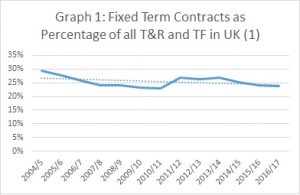 In 2002, UCEA agreed with the UCU that “fair and flexible employment arrangements should reflect … principles,” including the principle that “indefinite contracts are the general form of employment relationship between employers and employees” (UCU 2002: 6).
In 2002, UCEA agreed with the UCU that “fair and flexible employment arrangements should reflect … principles,” including the principle that “indefinite contracts are the general form of employment relationship between employers and employees” (UCU 2002: 6).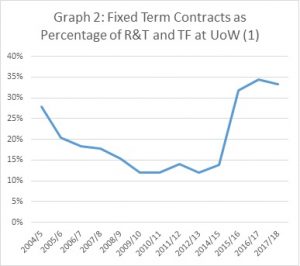 Staffing at the University of Warwick (UoW) initially mirrored UK trends, as the percentage of staff on fixed term contracts, employed for T&R and TF functions, declined from 28% in 2004/05 to reach a low of 12% in 2012/13. However, as elsewhere in the Russell Group (8), as of 2014/15 this percentage not only grew but by 2016/17 had achieved an all-time high (since ‘digital records are available’) of 34% (Graph 2)!
Staffing at the University of Warwick (UoW) initially mirrored UK trends, as the percentage of staff on fixed term contracts, employed for T&R and TF functions, declined from 28% in 2004/05 to reach a low of 12% in 2012/13. However, as elsewhere in the Russell Group (8), as of 2014/15 this percentage not only grew but by 2016/17 had achieved an all-time high (since ‘digital records are available’) of 34% (Graph 2)!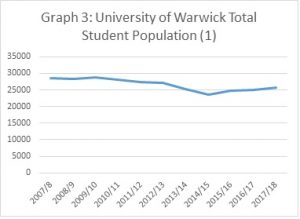 So while the sector as a whole has reduced its dependency on fixed term staff, the UoW appears to have used these staff to buffer changes to university funding, and to support growing student numbers (which had been on the decline since 2009/10, after the UK Parliament voted to increase the cap on fees to £9,000) (Graph 3).
So while the sector as a whole has reduced its dependency on fixed term staff, the UoW appears to have used these staff to buffer changes to university funding, and to support growing student numbers (which had been on the decline since 2009/10, after the UK Parliament voted to increase the cap on fees to £9,000) (Graph 3).

